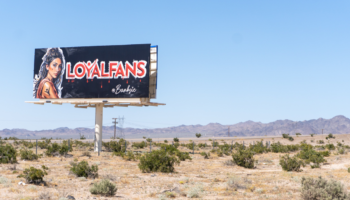In December of 2023, Joe Gow was fired from his job as a Chancellor at the University of Wisconsin La Crosse (UWLC). Gow was fired after the university’s board discovered his secret side hustle – making porn with his wife Carmen Wilson.
"In recent days, we learned of specific conduct by Dr. Gow that has subjected the university to significant reputational harm," UW System President Jay Rothman wrote in a statement about the firing. "His actions were abhorrent."
UW System Regent President Karen Walsh added, “We are alarmed, and disgusted, by his actions, which were wholly and undeniably inconsistent with his role as chancellor.”
Leaders within the university didn’t elaborate on which employment policies Gow violated, warranting his termination. Technically, Gow’s side hustle did violate a UWLC policy that states employees must disclose any outside of work projects that generate income. However, the UWLC Code of Ethics also states that “This code of ethics shall not prevent a University Staff member from accepting outside employment or following a pursuit which in no way interferes with the full and faithful discharge of his or her duties to the UW System.”
Gow and his wife made their spicy videos on their own time, not during work hours, and never on university property. They also went to great lengths to keep their day jobs separate from their night job. And, so far, none of Gow’s students or colleagues have made public complaints about his job performance. Since Gow’s side hustle arguably didn’t interfere with his ability to do his job, he could argue that UWLC is violating their own policies by firing him for having outside employment.
But we know the real story. Gow wasn’t fired for violating some policy in the code of ethics. Gow was fired for making porn, an activity that carries so much societal stigma that the university decided their continued association with him was detrimental to its reputation.
Interestingly, Gow is hardly the first person who’s publicly lost a job for doing sex work as a side hustle. High school teachers Brianna Coppage and Megan Gaither were forced to resign after someone posted a link to the OnlyFans account they’d created together in a community Facebook group, making it virtually impossible to do their jobs. Gregory Locke, who was an attorney and judge in New York City, was fired by city officials after they found his OnlyFans account. When Kirsten Vaughn’s boss fired her from her job as mechanic at a local car shop, he told her that her coworkers had discovered her OnlyFans page and she was “a distraction” in the workplace. Bill Clinton of course, we know what happened there.
These people, and the scores of others who have lost their jobs for doing sex work, were all fired for exercising their right to sexual expression, which Gow has argued is a violation of the First Amendment’s protections for free speech. Believe it or not, the experts we spoke to agree with him.
Sexual Expression and the First Amendment, say what?
The First Amendment to the United States Constitution prohibits the government from making any laws that limit citizen’s rights to free speech. Over the centuries since that amendment was written, dozens of court cases have confirmed that free speech is an untouchable right guaranteed to every American. The only exceptions are speech which promotes hate, incites violence, or is deemed “obscene” by a court of law.
Rulings in landmark First Amendment cases have also given some important guidelines about what’s included by the right to free speech. And all the way back in 1966, the Supreme Court ruled that pornographic material was protected by the First Amendment in the case of A Book Named "John Cleland's Memoirs of a Woman of Pleasure" v. Attorney General of Massachusetts. In 1973, the ruling in the Miller v. California case established the “Miller test,” which is still used to determine whether content is too obscene to be protected by the First Amendment.
Time and time again, courts have subjected pornographic content to the Miller Test and ruled that it doesn’t meet the definition of obscenity. The only blanket exception is sexual content featuring children under the age of 18. So, time and time again, American courts have confirmed that pornography is, in fact, free speech protected by the First Amendment.
Corey Silverstein, a lawyer who specializes in both First Amendment law and law pertaining to the adult entertainment industry, put it simply when we spoke to him: “The First Amendment is literally the cornerstone of what allows people in the adult entertainment industry or people seeking to share their thoughts, ideas, sexuality, nudity, whatever, and the government cannot do anything to interfere with that.”
Mike Stabile, the Director for Public Affairs at the Free Speech Coalition, also confirms that firing people for creating adult content is a violation of their right to free speech because the courts have repeatedly ruled that adult content is a protected form of speech. He added that punishing people for expressing their sexuality, publicly or privately, is dangerous because its a slippery slope. What's next?
The Free Speech Coalition is currently working on legal solutions to prevent banks from discriminating against sex workers and they’re involved in more than 20 legal cases against age verification laws, which haven’t proven effective at limiting children’s access to sexual content and place an undue burden on sex workers conducting business on the Internet. The organization is also investigating how employment discrimination against sex workers disproportionately impacts marginalized people, specifically women, queer folks, and trans folks. Since these folks are in protected classes, a successful wrongful termination case could open the door to legislation that protects sex workers from employment discrimination.
“It's not just about sex. It can be applied… to different forms of protest. Or having an opinion in general… Sexual speech is political speech. It is an affirmation of our sexuality. It's an affirmation of our identity. It's an affirmation that we won't be cowed by shame, and that what we do behind closed doors is wonderful and pleasurable, and that there's nothing wrong with it.”
And since sexual speech is protected by the First Amendment, it follows that all forms of sexual expression are free speech, and therefore, protected by the First Amendment. That belief is the foundation of the work done by the Woodhull Freedom Foundation, “the only human rights organization working full time to protect the fundamental human right to sexual freedom,” as their website states.
Ricci Joy Levy, the President and CEO of the Woodhull Freedom Foundation, explained that the First Amendment guarantees every American “the right to personal autonomy without government or societal interference,” and that consensual sexual expression of any kind falls under the First Amendment’s protections. Ricci added that the Harnishfeger v. United States case established the precedent that firing an employee for creating adult content outside of work is a First Amendment violation. “In that case, the court held that… the government couldn't fire an employee based on publishing a book about work as a phone sex operator, because she hadn't taken any steps to link the book to her place of employment.”
The Woodhull Freedom Foundation has brought, amongst many others, a constitutional challenge against the SESTA/FOSTA bills that censor sexual content online and made sex work much more unsafe for sex workers who primarily conducted their business online. The organization has also launched a Human Rights Commission aimed at legally securing the right to sexual freedom for all people.
Ricci continued, pointing out that Gow should be protected by the ruling in the Harnishfeger case.
“This is someone who didn't behave inappropriately in school, who did not in any way tie anything he was doing to the university, or he and his wife were doing to the university. The First Amendment specifically restricts states from retaliating against faculty members based on the controversial nature of their speech. So no, we know talking about sex in today's environment is immediately controversial, but this isn't obscene, in fact, it is protected. It occurred outside of work and is completely unrelated to their employment.”
Silverstein says that they are setting the precedent that employers can fire people for free speech they find distasteful, even though that's subjective. Which is a dangerous move. He added that when it comes to free speech, institutions can’t just say, 'Well, that whole first Amendment thing, well, we can kind of overlook it here because it's porn and it's yucky and that's wrong,' because the core of the First Amendment is that it protects all free speech, not just socially acceptable speech.
Holding Employers Accountable? Unlikely.
Though Silverstein, Stabile, and Levy all agreed that firing an employee for creating sexual content is a clear First Amendment violation, they also agreed that fired employees would face a steep uphill battle if they tried to bring a case against their former employers for violating their right to free speech.
First Amendment cases can only be lodged against government entities, not private businesses, Silverstein explained. “But if you're a publicly funded school, publicly funded court, what have you, now the First Amendment starts coming into play.”
So, employees of private businesses, like the mechanic who was fired for having an OnlyFans, can’t bring a case against their employers for violating their right to free speech, but employees of publicly funded institutions, like the UWLC where Gow worked and the public school where Coppage and Gaither worked, definitely have a valid First Amendment case. That is, unless their employment contracts include a morality clause, language that may states that an employee can be fired for behavior deemed “immoral.”
Morality clauses or similar language that requires an employee to adhere to a certain code of conduct are often how employers get away with firing employees for their behavior outside of work. They assert that the employee’s after hours behavior violated their employment contract’s morality clause and harmed the business’s reputation. Though UWLC leadership didn’t explicitly state that they were firing Gow for violating a morality clause in his employment contract, their statements make it clear that they believe being associated with a person who creates sexual content is harmful to the university’s reputation.
Our experts agreed there's no shortage of absurdity when it comes to controlling people's sexuality. In the education context, Silverstein makes an important point when it comes to understanding what message they sending to their students as, “It ignores very basic First Amendment principles that these universities are supposed to be instilling in future students, not closing their minds off." Shutting of the sexuality and gender debate is very dangerous, for individuals, for democracy, for our future in times of increasing censorship.
Silverstein added that the alleged reputational harm businesses face from being associated with sex workers comes not from the sex work itself, but from the stigma associated with sex work. Even worse, if those businesses have a morality clause or similar language about a code of conduct in their employment contracts, employees fired for their side hustles in the sex industry have limited ability to fight back, even when their right to free speech has clearly been violated.
Even so, all three experts argued that it’s important to bring these cases in front of the courts whenever possible because each new legal precedent starts with a landmark case. If Gow follows through with his First Amendment case against the UWLC, it could be the landmark case that changes employer’s ability to fire employees for doing sex work.
Legally Sanctioned Discrimination
What about the employees who are fired from private businesses for moonlighting as sex workers and, can’t sue their employers for violating their First Amendment rights? Do they have any legal recourse when they’re fired for doing completely legal, consensual sex work?
Unfortunately, no. Even though their employers are clearly discriminating against them for their after hours sex work. When it comes to employment law, discrimination is very precisely and narrowly defined. According to the U.S. Equal Employment Opportunity Commission (EEOC), it’s only illegal to discriminate against people based on “race, color, religion, sex (including gender identity, sexual orientation, and pregnancy), national origin, age (40 or older), disability or genetic information.” These categories are called “protected classes,” and anybody whose identity aligns them with one of these protected classes cannot be discriminated against because of their protected identity. If a queer person is fired from their job, it’s not automatically considered employment discrimination. If they sue their employer for wrongful termination, they have to prove that they were fired because they are queer.
People who are fired for any other reason are not protected by employment discrimination laws. And since sex workers definitely aren’t a protected class, it’s totally legal to fire them just for doing sex work, even if they do it entirely on their own time, outside of work, and it doesn’t impact their job in any way.
Levy lamented the hypocrisy of this, saying, “What did this have to do with his ability to do his job? Nowhere does he say he couldn't do his job. It just says, ‘Oh my God, you had sex in front of a camera! You're fired…’ They're discriminating against someone engaging in consensual sexual expression.”
Stabile agreed, stating, “What we do, whether it's in our bedrooms or whether it's in front of a camera, are entirely unrelated to our job performance and should be treated as such… Any other type of activity that happens in the bedroom that is not related to what I do at work, and we need to categorize this in terms of the same way. Things that people do off the clock should not affect their employment.”
He added, “I think that when you hear that someone was fired from a Taco Bell because they have an OnlyFans, you think for what possible reason? How could that possibly affect their job? Was there any downside to it? Did anybody complain? Was there any issue at all, or was it just purely [that] someone was uncomfortable with someone else's sexuality?”
And that means people who do all kinds of sex work outside of work – camming, posting on OnlyFans, creating pornography, stripping, professionally sexting etc. – don’t have any way to legally fight back when they’re discriminated against in the workplace.
Changing Minds in Changing Times
Because of advocates like Levy, Silverstein, and Stabile, the legal protections afforded to sex workers are shifting for the better, albeit, slowly. Definitely not at the pace of innovation in the adult industry. Then landscape of what it means to be in sex work has dramatically changed in the last five years. And yet,
“There [are] lots of preconceived notions and misinformation about what the old industry did and who we are now. That leads to people who are very frequently hesitant to work or live or bank with us,” Stabile said. “What we've seen in the past few years is that there's been an explosion of people who have gone into the adult industry, to sites like OnlyFans, Clips for Sale and other fan sites and cam sites, and that's meant that millions of people who were previously unaffiliated with adult may not understand the level of discrimination are now facing… For a long time, sex work was in the shadows… Now you're talking about millions of people worldwide, millions of people who are creating content and suffering this [discrimination].” Stabile hopes that this massive shift in the industry will result in tangible change for all sex workers.
Levy, Silverstein, Stabile, and the organizations they work with are fighting to get society and culture caught up with the changing times. They’re doing the boots on the ground work to win legal protections and make the future safer for sex workers. Though they know they’re fighting a battle that’s exceedingly tough to win in an increasingly sex-negative political climate, but as Stabile put it,
“Standing up again, when you have the resources, when you have the bandwidth to do it, is important… The history of sex work and the history of sexuality advocacy is that this type of discrimination flourishes when we don't speak out, when we're forced into the shadows.”


















